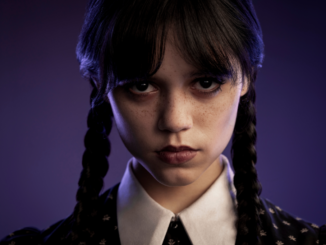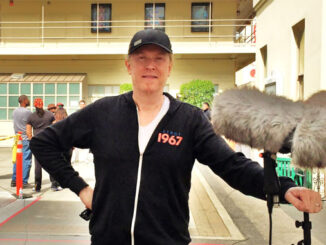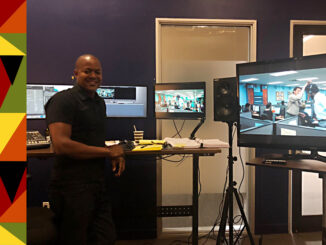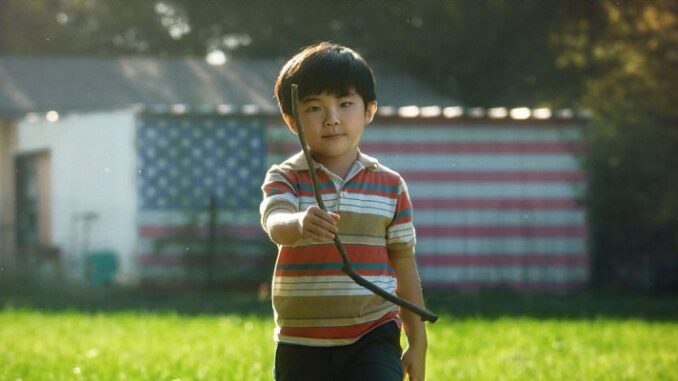
by Patrick Z. McGavin
Lee Isaac Chung’s semi-autobiographical fourth film “Minari” won the U.S. dramatic grand jury prize and audience award at Sundance.
Set in Reagan-era Arkansas, the story captures the cultural disruption of a Korean-American immigrant family led by Jacob (Steven Yeun) trying to build a new life as farmers.
The film also struck a deep emotional chord with its editor, Harry Yoon. Born in South Korea, he came to the United States at the age of 5 and grew up in Northern California.
In an interview, Yoon talked about the American Dream, the complexities of language, and how his immigrant background shaped his process.
CineMontage: Did you have an existing creative relationship with the director Lee Isaac Chung?
Harry Yoon: I met him through the producer Christina Oh of Plan B. We worked together on “The Last Black Man in San Francisco” (2019). From the moment I interviewed with her, we just really hit it off.
We’re both Korean-Americans, and we both have immigrant parents. We talked a little bit about what it was like to make the tough decision to choose a risky career like film in the face of seeing your parents work so sacrificially in small businesses.
While I was working on (the HBO show) “Euphoria,” she called me up and said: “I’m working on a very special project, and I’d love for you to take a read.” It just blew me away.
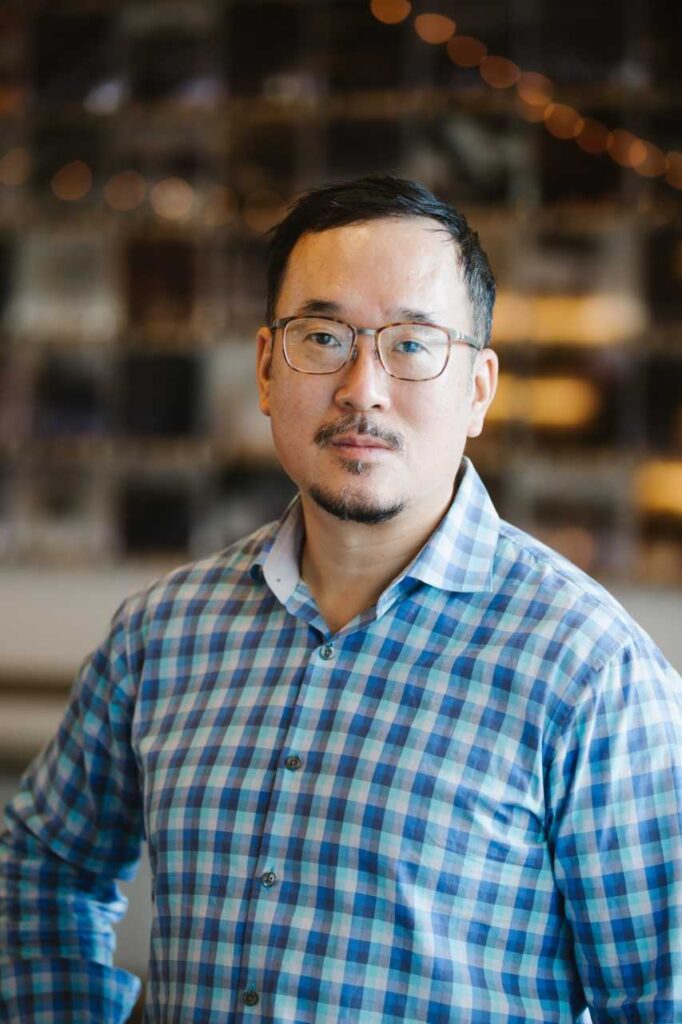
Was there any specific research you did? Did you talk about other films?
Yoon: One of the things Isaac mentioned was he really was influenced by the films of (the Japanese director) Hirokazu Koreeda. He’s one of my favorite filmmakers as well. I remember very distinctly seeing “Nobody Knows” (2004), and just being blown away by how these quiet observations that feel so everyday could add up to such emotionally powerful moments.
There was one film by him in particular, “Still Walking” (2008), about tone and that kind of reflective quality that feels both very present in the moment but also also a reverie on time that has passed, relationships that are old relationships and things like that.
That really fused the tone we were trying to set in “Minari,” because it’s so specific and so present. It also has this quality of memory, this quality of reflection, that is very organic to the fact that so much of the film is based upon Isaac’s own memory of what it was like to be a child in that time.
How did the director’s autobiographical connection to the material impact your work on the film?
Yoon: So many of the scenes, especially seeing them come to life in the dailies, were these explosions of memory. I could smell the red pepper and the anchovies as they were being unpacked from the grandmother’s bag. I knew exactly what the smell was like.
In my own childhood, my father’s mother came to live with us, and she was such a stranger. I recall with a great deal of regret that I didn’t spend the time to really get to know her and to really develop a strong relationship with her because she felt so alien at the time. Working on and watching this film felt redemptive because it brought back so many personal memories of my own immigrant childhood in California.
The opening shot is of the youngest child, David (Alan S. Kim), in the backseat of the car. That foreshadows so much of the film being captured from a child’s perspective.
Yoon: It was very important to us to allow the camera to linger enough so the audience becomes invested in David’s point of view. I know the script began as a series of journal entries that Isaac wrote down as he reflected on that age. I think it was inspired by his daughter reaching that age, and him thinking what kind of legacy can I leave her as far as my own experiences. I think that’s why the movie is so vivid, why the images are so specific.
One of the first spoken lines is, “Look at the color.” How did nature and landscape inform the editing?
Tremendously, particularly once we started getting the wider drone shots as well as that beautiful early shot of Steven Yeun’s character driving the tractor. I think we started to realize this perspective of the land being almost a mythic place, a garden of Eden, conveying an importance to him and the rest of the characters.
One of the things that really enriched this understanding was the composer Emile Mosseri wrote a couple of sketches for Isaac during pre-production. One of his pieces was called “Tall Grass,” and it conveyed in a way that was just deeply meaningful and emotional, what the kind of relationship to the land was. The landscape becomes a character in its own right, both in the story of Steven’s character and also in the memory of Isaac and David as his proxy.
The movie’s a rare object, a foreign language film made in America. Are you fluent in Korean?
Yoon: It would be generous to call me semi-fluent. I know the language well enough to recognize the correctness of tone and to understand 90% of what was being said. It felt very much like listening to members of my own family.
With that being said, it became very specific and challenging when we were choosing the right subtitles and trying to create an economy and specificity of language. We had tremendous help from a friend of the production, a woman named Stefanie Hong who has subtitled Korean features for the American market.
I really saw that in the same way when you’re translating poetry or literature from another language, how important it was to have someone who understood the sensitivity of both languages in order to get at the heart of what was being said and not just the letter of what was being said. We really appreciated Stefanie’s help in getting to an English translation that felt true and seamless.
Two of the featured actors are kids, David and his sister (Noel Kate Cho). How challenging was it capturing the spontaneity and unpredictability of kids?
Yoon: It was wonderful because you could see the natural talent that they both had. I think they were not so experienced that they had developed habits that were overly gestural. Even at times when they did, those were the takes we avoided. We wanted to focus on moments where they were naturally reacting to the environment around them.
One scene that comes to mind is when David is being punished for something terrible he does to his grandmother. There was a level of seriousness, even between takes, that Isaac made sure that he kept through the shoot so that Alan, who’s an amazing and instinctual actor, realized he had to take this very seriously as well. That helped bring out the more naturalistic and more lived in performances.
The appearance of the grandmother (Youn Yuh-jung) really shakes up the story. Did you alter the rhythms to show how she upends the story?
Yoon: Some of her early scenes we linger on frames a little bit longer, and I think it’s just to give you a sense of her presence, especially her voice, because she has such an amazing voice.
One of my favorite scenes, perhaps my favorite, is where she is unpacking the bag she brought with her from Korea. There is so much about the small gestures, the interactions with her daughter, Monica (Han Ye-ri), that we just want it to be still and really hone in on everything she is doing to bring this character to life.
She brings out the envelope of money at the end. You just want to drink in her presence. Monica notices that David is in the doorway, and we have been experiencing the perspective of David really studying his grandmother for the first time. Everything this woman does is meant to feel both fascinating and alien to David.
The interaction of David and his grandmother really shape the final movements of the film. What was that process like?
Yoon: That was such a joy. I feel like so many of the themes of the film—this land as a mythical place, the resolution for the multigenerational conflict—we want to really linger on that, both musically through Emile’s beautiful score and with these wider and longer shots. We wanted to create this portrait, an idyllic harmony, as if Eden has come about, especially between these two characters.
Cutting their scenes were often my favorite scenes because they have this comedic chemistry that is so hard to plan for but it is such gold when you see it. Particularly I loved the silent reaction shots that punctuate those moments where David is observing her. That tension and conflict was a real pleasure to cut.
Is editing something you came to organically, or was it a more sideways connection?
Yoon: I think sideways is a pretty good way to get at it. I loved filmmaking from very early in my college career, but we didn’t have a film program at Williams College. Later in my 20s, I was able to go to a graduate directing program at NYU.
I had to take a leave of absence for financial reasons. I think that was symptomatic of an ambivalence I had toward committing a career in film, because I was the first son of an immigrant Korean family. It was such a risky decision. It wasn’t until I turned 30 that I finally made the commitment. I realized that my technical background as well as my ability to be in dialogue and help on the visions of other creative people made editing the most appropriate path. I could make a liveable wage as an editor or as an assistant editor faster than as a writer and director or as a producer.
I feel so grateful those external factors led me to a career that I enjoy every day. It feels like magic that we get to be the first audiences for anything that we are cutting.
How has your own style evolved since you first began?
Harry Yoon: I don’t know if I could speak to a particular style. I could definitely speak to material that attracts or fascinates me. It’s always a deep dive into the experience of how a character changes. I’m attracted to those scripts which you can delve into the very real human experience as the character goes through big changes.
Maybe that’s because that has defined my life, making risky and difficult choices, but also in really appreciating the journey as much at the end.
Patrick Z. McGavin is a Chicago-based writer and cultural journalist.


